Analysis of Oppression: Individuals and Societal Challenges Essay
VerifiedAdded on 2023/03/31
|9
|2276
|294
Essay
AI Summary
This essay delves into the concept of intersectionality, examining the diverse forms of oppression individuals face in the modern world, ranging from racial and linguistic discrimination to issues of appearance and cultural bias. It analyzes the experiences of authors such as Henry Louis Gates, Gloria Anzaldua, and Judith Ortiz Cofer, who have encountered oppression in various forms. The essay explores how factors like race, language, and societal stereotypes contribute to these experiences, highlighting the impact of microaggressions and systemic biases. It discusses how these authors have been affected by racism and prejudice, and how they have navigated these challenges. The essay examines the ways in which these authors have been impacted by societal expectations and how they have responded to the prejudice they have faced, providing insights into the complexities of oppression and its effects on individuals. The essay highlights the importance of understanding the various ways in which oppression manifests itself and the impact it has on individuals.
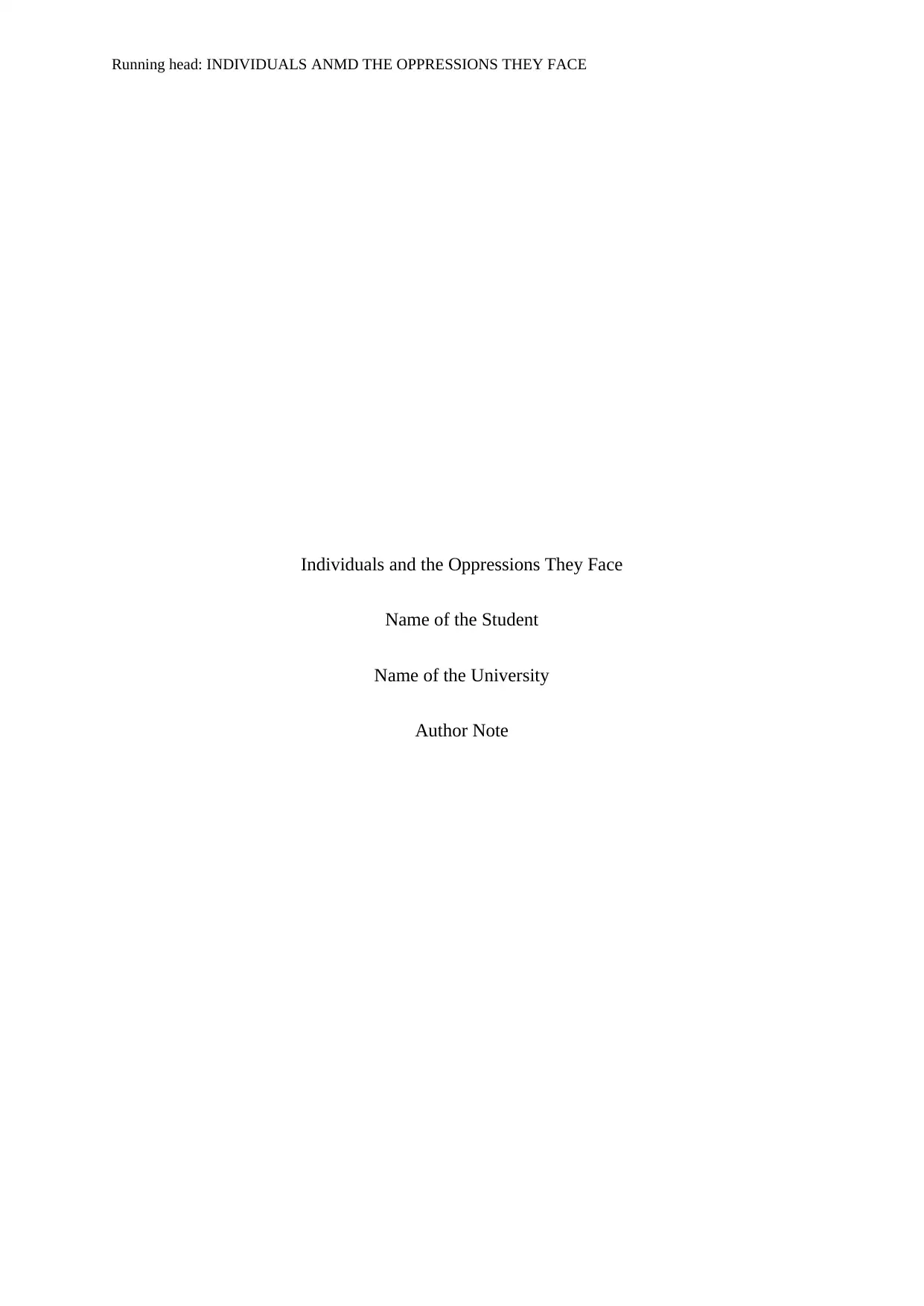
Running head: INDIVIDUALS ANMD THE OPPRESSIONS THEY FACE
Individuals and the Oppressions They Face
Name of the Student
Name of the University
Author Note
Individuals and the Oppressions They Face
Name of the Student
Name of the University
Author Note
Paraphrase This Document
Need a fresh take? Get an instant paraphrase of this document with our AI Paraphraser
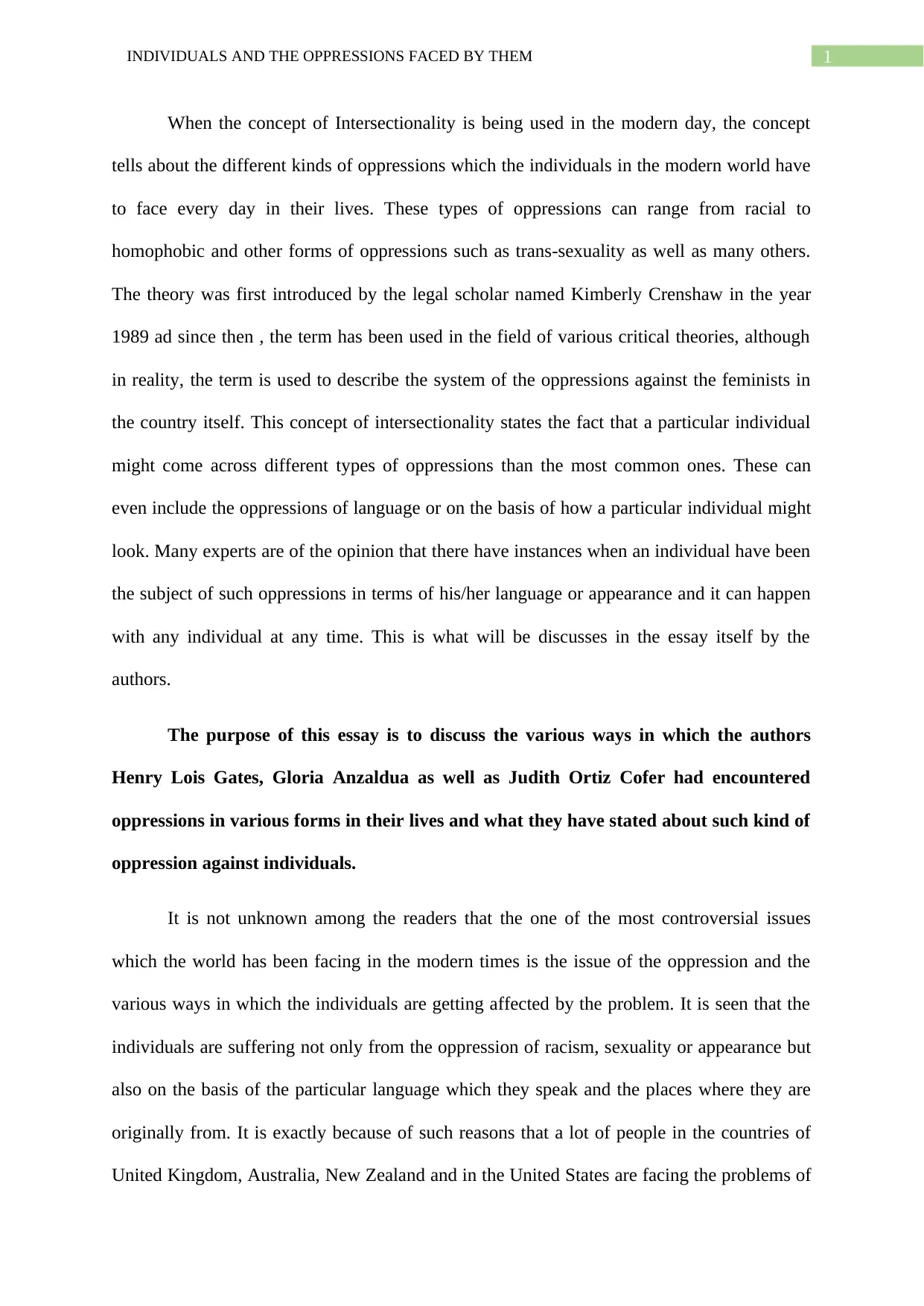
1INDIVIDUALS AND THE OPPRESSIONS FACED BY THEM
When the concept of Intersectionality is being used in the modern day, the concept
tells about the different kinds of oppressions which the individuals in the modern world have
to face every day in their lives. These types of oppressions can range from racial to
homophobic and other forms of oppressions such as trans-sexuality as well as many others.
The theory was first introduced by the legal scholar named Kimberly Crenshaw in the year
1989 ad since then , the term has been used in the field of various critical theories, although
in reality, the term is used to describe the system of the oppressions against the feminists in
the country itself. This concept of intersectionality states the fact that a particular individual
might come across different types of oppressions than the most common ones. These can
even include the oppressions of language or on the basis of how a particular individual might
look. Many experts are of the opinion that there have instances when an individual have been
the subject of such oppressions in terms of his/her language or appearance and it can happen
with any individual at any time. This is what will be discusses in the essay itself by the
authors.
The purpose of this essay is to discuss the various ways in which the authors
Henry Lois Gates, Gloria Anzaldua as well as Judith Ortiz Cofer had encountered
oppressions in various forms in their lives and what they have stated about such kind of
oppression against individuals.
It is not unknown among the readers that the one of the most controversial issues
which the world has been facing in the modern times is the issue of the oppression and the
various ways in which the individuals are getting affected by the problem. It is seen that the
individuals are suffering not only from the oppression of racism, sexuality or appearance but
also on the basis of the particular language which they speak and the places where they are
originally from. It is exactly because of such reasons that a lot of people in the countries of
United Kingdom, Australia, New Zealand and in the United States are facing the problems of
When the concept of Intersectionality is being used in the modern day, the concept
tells about the different kinds of oppressions which the individuals in the modern world have
to face every day in their lives. These types of oppressions can range from racial to
homophobic and other forms of oppressions such as trans-sexuality as well as many others.
The theory was first introduced by the legal scholar named Kimberly Crenshaw in the year
1989 ad since then , the term has been used in the field of various critical theories, although
in reality, the term is used to describe the system of the oppressions against the feminists in
the country itself. This concept of intersectionality states the fact that a particular individual
might come across different types of oppressions than the most common ones. These can
even include the oppressions of language or on the basis of how a particular individual might
look. Many experts are of the opinion that there have instances when an individual have been
the subject of such oppressions in terms of his/her language or appearance and it can happen
with any individual at any time. This is what will be discusses in the essay itself by the
authors.
The purpose of this essay is to discuss the various ways in which the authors
Henry Lois Gates, Gloria Anzaldua as well as Judith Ortiz Cofer had encountered
oppressions in various forms in their lives and what they have stated about such kind of
oppression against individuals.
It is not unknown among the readers that the one of the most controversial issues
which the world has been facing in the modern times is the issue of the oppression and the
various ways in which the individuals are getting affected by the problem. It is seen that the
individuals are suffering not only from the oppression of racism, sexuality or appearance but
also on the basis of the particular language which they speak and the places where they are
originally from. It is exactly because of such reasons that a lot of people in the countries of
United Kingdom, Australia, New Zealand and in the United States are facing the problems of
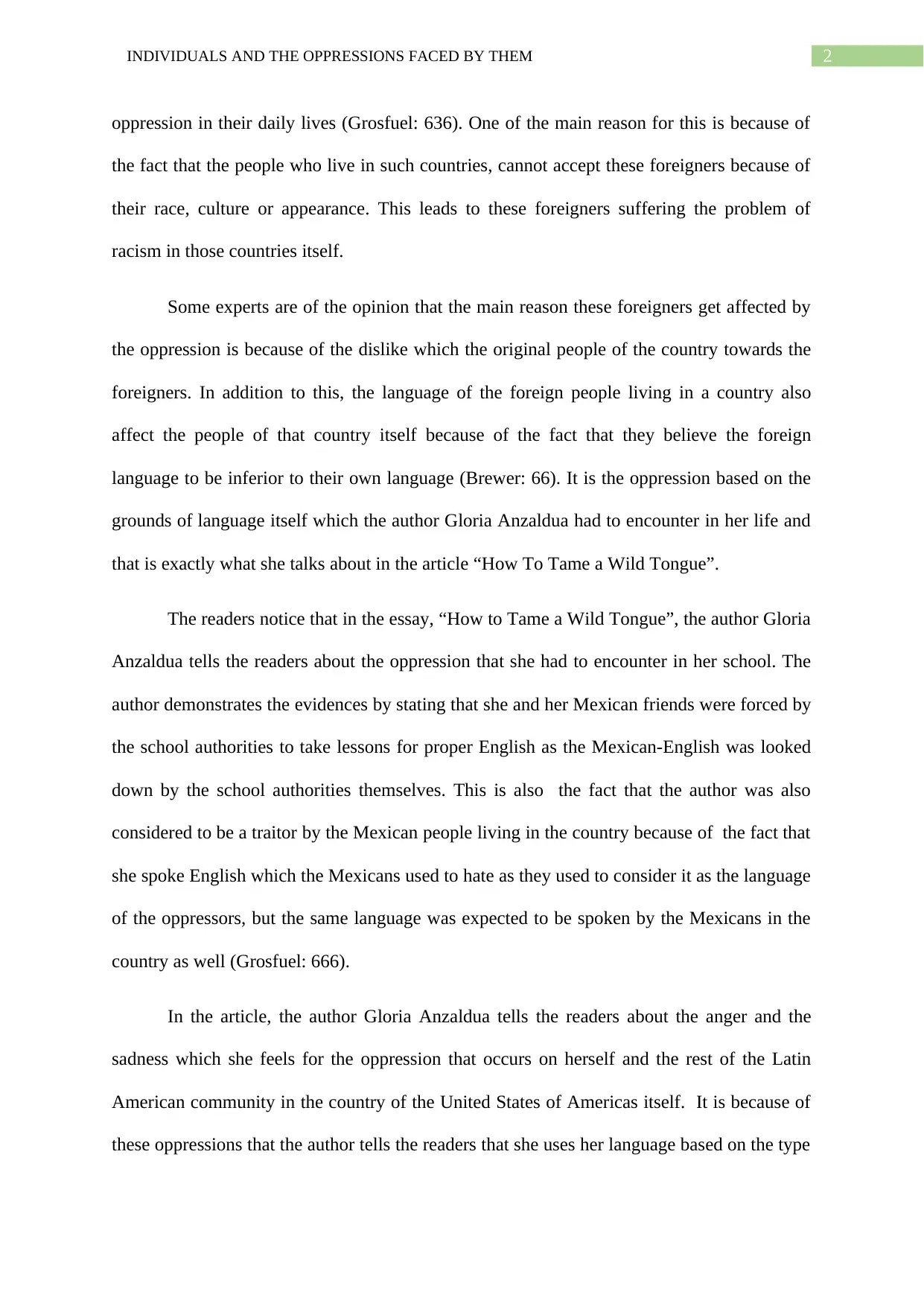
2INDIVIDUALS AND THE OPPRESSIONS FACED BY THEM
oppression in their daily lives (Grosfuel: 636). One of the main reason for this is because of
the fact that the people who live in such countries, cannot accept these foreigners because of
their race, culture or appearance. This leads to these foreigners suffering the problem of
racism in those countries itself.
Some experts are of the opinion that the main reason these foreigners get affected by
the oppression is because of the dislike which the original people of the country towards the
foreigners. In addition to this, the language of the foreign people living in a country also
affect the people of that country itself because of the fact that they believe the foreign
language to be inferior to their own language (Brewer: 66). It is the oppression based on the
grounds of language itself which the author Gloria Anzaldua had to encounter in her life and
that is exactly what she talks about in the article “How To Tame a Wild Tongue”.
The readers notice that in the essay, “How to Tame a Wild Tongue”, the author Gloria
Anzaldua tells the readers about the oppression that she had to encounter in her school. The
author demonstrates the evidences by stating that she and her Mexican friends were forced by
the school authorities to take lessons for proper English as the Mexican-English was looked
down by the school authorities themselves. This is also the fact that the author was also
considered to be a traitor by the Mexican people living in the country because of the fact that
she spoke English which the Mexicans used to hate as they used to consider it as the language
of the oppressors, but the same language was expected to be spoken by the Mexicans in the
country as well (Grosfuel: 666).
In the article, the author Gloria Anzaldua tells the readers about the anger and the
sadness which she feels for the oppression that occurs on herself and the rest of the Latin
American community in the country of the United States of Americas itself. It is because of
these oppressions that the author tells the readers that she uses her language based on the type
oppression in their daily lives (Grosfuel: 636). One of the main reason for this is because of
the fact that the people who live in such countries, cannot accept these foreigners because of
their race, culture or appearance. This leads to these foreigners suffering the problem of
racism in those countries itself.
Some experts are of the opinion that the main reason these foreigners get affected by
the oppression is because of the dislike which the original people of the country towards the
foreigners. In addition to this, the language of the foreign people living in a country also
affect the people of that country itself because of the fact that they believe the foreign
language to be inferior to their own language (Brewer: 66). It is the oppression based on the
grounds of language itself which the author Gloria Anzaldua had to encounter in her life and
that is exactly what she talks about in the article “How To Tame a Wild Tongue”.
The readers notice that in the essay, “How to Tame a Wild Tongue”, the author Gloria
Anzaldua tells the readers about the oppression that she had to encounter in her school. The
author demonstrates the evidences by stating that she and her Mexican friends were forced by
the school authorities to take lessons for proper English as the Mexican-English was looked
down by the school authorities themselves. This is also the fact that the author was also
considered to be a traitor by the Mexican people living in the country because of the fact that
she spoke English which the Mexicans used to hate as they used to consider it as the language
of the oppressors, but the same language was expected to be spoken by the Mexicans in the
country as well (Grosfuel: 666).
In the article, the author Gloria Anzaldua tells the readers about the anger and the
sadness which she feels for the oppression that occurs on herself and the rest of the Latin
American community in the country of the United States of Americas itself. It is because of
these oppressions that the author tells the readers that she uses her language based on the type
⊘ This is a preview!⊘
Do you want full access?
Subscribe today to unlock all pages.

Trusted by 1+ million students worldwide
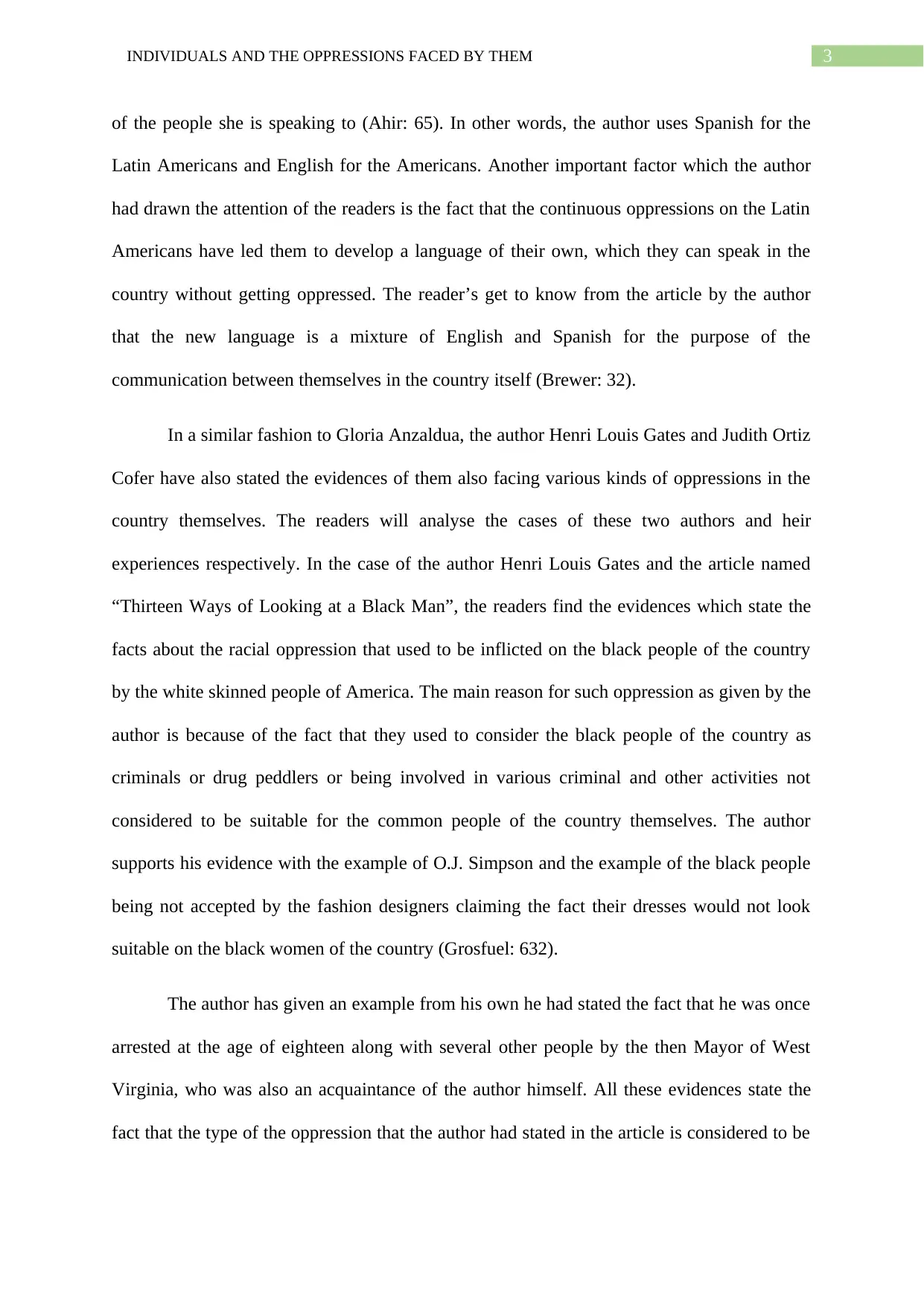
3INDIVIDUALS AND THE OPPRESSIONS FACED BY THEM
of the people she is speaking to (Ahir: 65). In other words, the author uses Spanish for the
Latin Americans and English for the Americans. Another important factor which the author
had drawn the attention of the readers is the fact that the continuous oppressions on the Latin
Americans have led them to develop a language of their own, which they can speak in the
country without getting oppressed. The reader’s get to know from the article by the author
that the new language is a mixture of English and Spanish for the purpose of the
communication between themselves in the country itself (Brewer: 32).
In a similar fashion to Gloria Anzaldua, the author Henri Louis Gates and Judith Ortiz
Cofer have also stated the evidences of them also facing various kinds of oppressions in the
country themselves. The readers will analyse the cases of these two authors and heir
experiences respectively. In the case of the author Henri Louis Gates and the article named
“Thirteen Ways of Looking at a Black Man”, the readers find the evidences which state the
facts about the racial oppression that used to be inflicted on the black people of the country
by the white skinned people of America. The main reason for such oppression as given by the
author is because of the fact that they used to consider the black people of the country as
criminals or drug peddlers or being involved in various criminal and other activities not
considered to be suitable for the common people of the country themselves. The author
supports his evidence with the example of O.J. Simpson and the example of the black people
being not accepted by the fashion designers claiming the fact their dresses would not look
suitable on the black women of the country (Grosfuel: 632).
The author has given an example from his own he had stated the fact that he was once
arrested at the age of eighteen along with several other people by the then Mayor of West
Virginia, who was also an acquaintance of the author himself. All these evidences state the
fact that the type of the oppression that the author had stated in the article is considered to be
of the people she is speaking to (Ahir: 65). In other words, the author uses Spanish for the
Latin Americans and English for the Americans. Another important factor which the author
had drawn the attention of the readers is the fact that the continuous oppressions on the Latin
Americans have led them to develop a language of their own, which they can speak in the
country without getting oppressed. The reader’s get to know from the article by the author
that the new language is a mixture of English and Spanish for the purpose of the
communication between themselves in the country itself (Brewer: 32).
In a similar fashion to Gloria Anzaldua, the author Henri Louis Gates and Judith Ortiz
Cofer have also stated the evidences of them also facing various kinds of oppressions in the
country themselves. The readers will analyse the cases of these two authors and heir
experiences respectively. In the case of the author Henri Louis Gates and the article named
“Thirteen Ways of Looking at a Black Man”, the readers find the evidences which state the
facts about the racial oppression that used to be inflicted on the black people of the country
by the white skinned people of America. The main reason for such oppression as given by the
author is because of the fact that they used to consider the black people of the country as
criminals or drug peddlers or being involved in various criminal and other activities not
considered to be suitable for the common people of the country themselves. The author
supports his evidence with the example of O.J. Simpson and the example of the black people
being not accepted by the fashion designers claiming the fact their dresses would not look
suitable on the black women of the country (Grosfuel: 632).
The author has given an example from his own he had stated the fact that he was once
arrested at the age of eighteen along with several other people by the then Mayor of West
Virginia, who was also an acquaintance of the author himself. All these evidences state the
fact that the type of the oppression that the author had stated in the article is considered to be
Paraphrase This Document
Need a fresh take? Get an instant paraphrase of this document with our AI Paraphraser
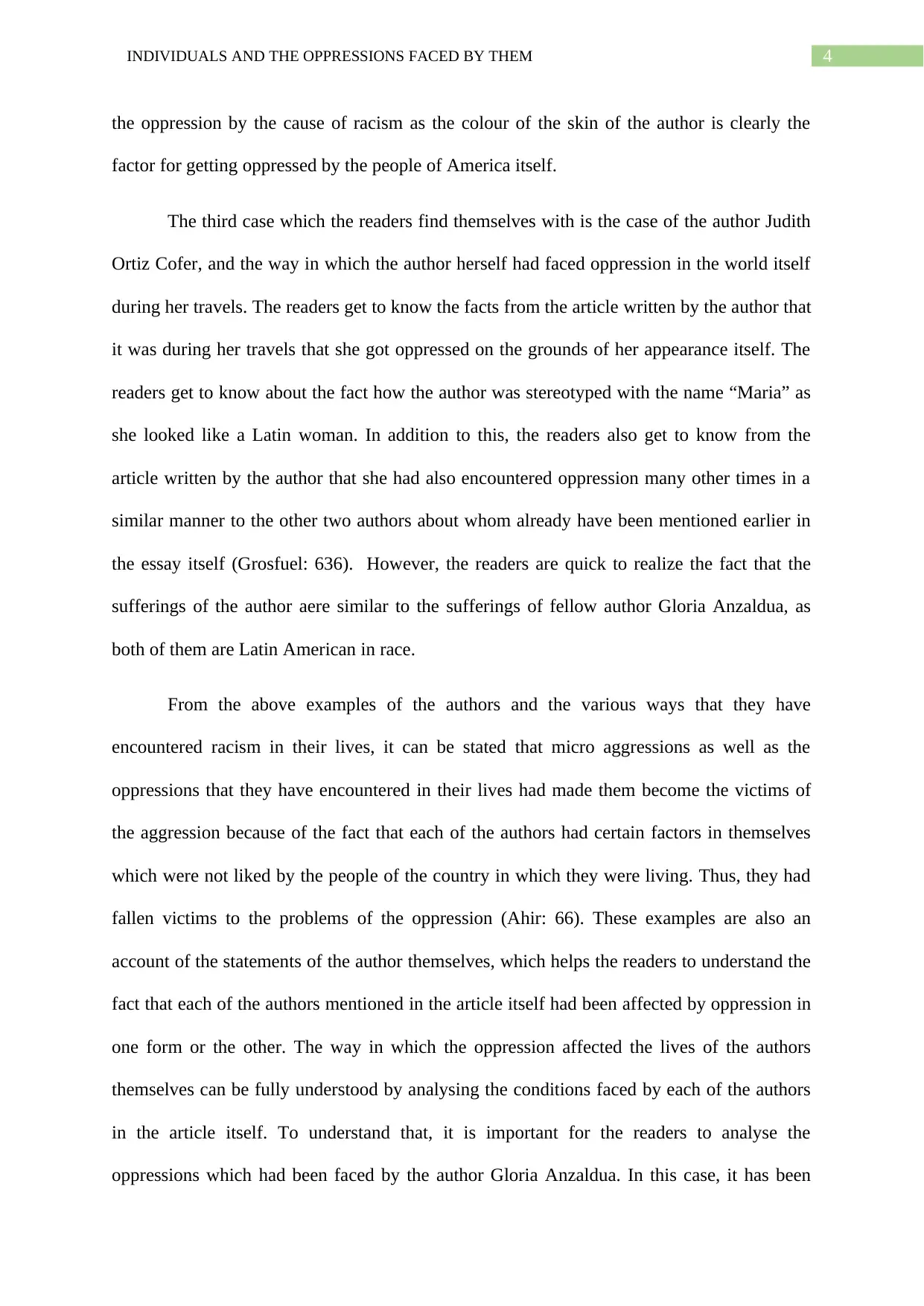
4INDIVIDUALS AND THE OPPRESSIONS FACED BY THEM
the oppression by the cause of racism as the colour of the skin of the author is clearly the
factor for getting oppressed by the people of America itself.
The third case which the readers find themselves with is the case of the author Judith
Ortiz Cofer, and the way in which the author herself had faced oppression in the world itself
during her travels. The readers get to know the facts from the article written by the author that
it was during her travels that she got oppressed on the grounds of her appearance itself. The
readers get to know about the fact how the author was stereotyped with the name “Maria” as
she looked like a Latin woman. In addition to this, the readers also get to know from the
article written by the author that she had also encountered oppression many other times in a
similar manner to the other two authors about whom already have been mentioned earlier in
the essay itself (Grosfuel: 636). However, the readers are quick to realize the fact that the
sufferings of the author aere similar to the sufferings of fellow author Gloria Anzaldua, as
both of them are Latin American in race.
From the above examples of the authors and the various ways that they have
encountered racism in their lives, it can be stated that micro aggressions as well as the
oppressions that they have encountered in their lives had made them become the victims of
the aggression because of the fact that each of the authors had certain factors in themselves
which were not liked by the people of the country in which they were living. Thus, they had
fallen victims to the problems of the oppression (Ahir: 66). These examples are also an
account of the statements of the author themselves, which helps the readers to understand the
fact that each of the authors mentioned in the article itself had been affected by oppression in
one form or the other. The way in which the oppression affected the lives of the authors
themselves can be fully understood by analysing the conditions faced by each of the authors
in the article itself. To understand that, it is important for the readers to analyse the
oppressions which had been faced by the author Gloria Anzaldua. In this case, it has been
the oppression by the cause of racism as the colour of the skin of the author is clearly the
factor for getting oppressed by the people of America itself.
The third case which the readers find themselves with is the case of the author Judith
Ortiz Cofer, and the way in which the author herself had faced oppression in the world itself
during her travels. The readers get to know the facts from the article written by the author that
it was during her travels that she got oppressed on the grounds of her appearance itself. The
readers get to know about the fact how the author was stereotyped with the name “Maria” as
she looked like a Latin woman. In addition to this, the readers also get to know from the
article written by the author that she had also encountered oppression many other times in a
similar manner to the other two authors about whom already have been mentioned earlier in
the essay itself (Grosfuel: 636). However, the readers are quick to realize the fact that the
sufferings of the author aere similar to the sufferings of fellow author Gloria Anzaldua, as
both of them are Latin American in race.
From the above examples of the authors and the various ways that they have
encountered racism in their lives, it can be stated that micro aggressions as well as the
oppressions that they have encountered in their lives had made them become the victims of
the aggression because of the fact that each of the authors had certain factors in themselves
which were not liked by the people of the country in which they were living. Thus, they had
fallen victims to the problems of the oppression (Ahir: 66). These examples are also an
account of the statements of the author themselves, which helps the readers to understand the
fact that each of the authors mentioned in the article itself had been affected by oppression in
one form or the other. The way in which the oppression affected the lives of the authors
themselves can be fully understood by analysing the conditions faced by each of the authors
in the article itself. To understand that, it is important for the readers to analyse the
oppressions which had been faced by the author Gloria Anzaldua. In this case, it has been
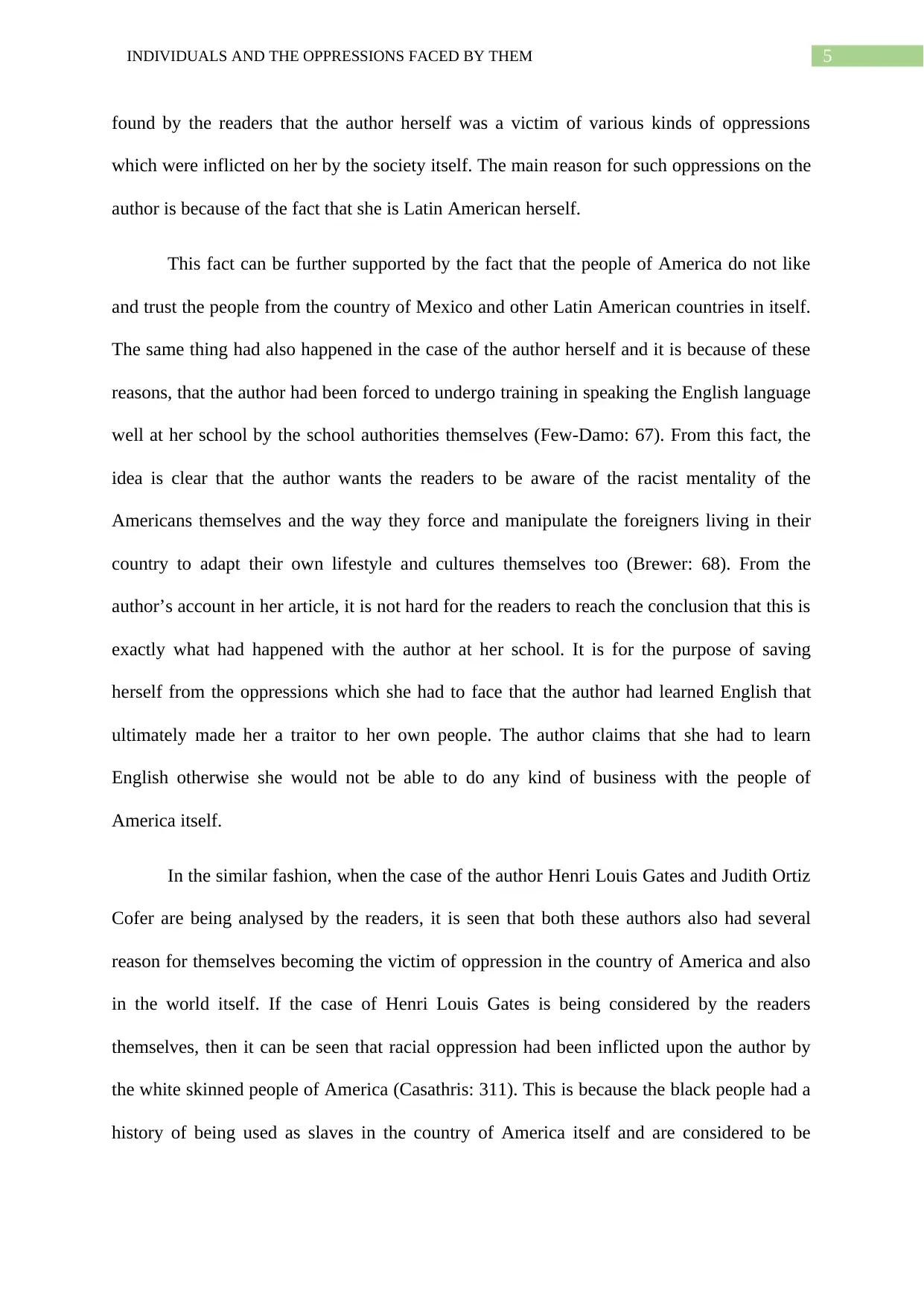
5INDIVIDUALS AND THE OPPRESSIONS FACED BY THEM
found by the readers that the author herself was a victim of various kinds of oppressions
which were inflicted on her by the society itself. The main reason for such oppressions on the
author is because of the fact that she is Latin American herself.
This fact can be further supported by the fact that the people of America do not like
and trust the people from the country of Mexico and other Latin American countries in itself.
The same thing had also happened in the case of the author herself and it is because of these
reasons, that the author had been forced to undergo training in speaking the English language
well at her school by the school authorities themselves (Few-Damo: 67). From this fact, the
idea is clear that the author wants the readers to be aware of the racist mentality of the
Americans themselves and the way they force and manipulate the foreigners living in their
country to adapt their own lifestyle and cultures themselves too (Brewer: 68). From the
author’s account in her article, it is not hard for the readers to reach the conclusion that this is
exactly what had happened with the author at her school. It is for the purpose of saving
herself from the oppressions which she had to face that the author had learned English that
ultimately made her a traitor to her own people. The author claims that she had to learn
English otherwise she would not be able to do any kind of business with the people of
America itself.
In the similar fashion, when the case of the author Henri Louis Gates and Judith Ortiz
Cofer are being analysed by the readers, it is seen that both these authors also had several
reason for themselves becoming the victim of oppression in the country of America and also
in the world itself. If the case of Henri Louis Gates is being considered by the readers
themselves, then it can be seen that racial oppression had been inflicted upon the author by
the white skinned people of America (Casathris: 311). This is because the black people had a
history of being used as slaves in the country of America itself and are considered to be
found by the readers that the author herself was a victim of various kinds of oppressions
which were inflicted on her by the society itself. The main reason for such oppressions on the
author is because of the fact that she is Latin American herself.
This fact can be further supported by the fact that the people of America do not like
and trust the people from the country of Mexico and other Latin American countries in itself.
The same thing had also happened in the case of the author herself and it is because of these
reasons, that the author had been forced to undergo training in speaking the English language
well at her school by the school authorities themselves (Few-Damo: 67). From this fact, the
idea is clear that the author wants the readers to be aware of the racist mentality of the
Americans themselves and the way they force and manipulate the foreigners living in their
country to adapt their own lifestyle and cultures themselves too (Brewer: 68). From the
author’s account in her article, it is not hard for the readers to reach the conclusion that this is
exactly what had happened with the author at her school. It is for the purpose of saving
herself from the oppressions which she had to face that the author had learned English that
ultimately made her a traitor to her own people. The author claims that she had to learn
English otherwise she would not be able to do any kind of business with the people of
America itself.
In the similar fashion, when the case of the author Henri Louis Gates and Judith Ortiz
Cofer are being analysed by the readers, it is seen that both these authors also had several
reason for themselves becoming the victim of oppression in the country of America and also
in the world itself. If the case of Henri Louis Gates is being considered by the readers
themselves, then it can be seen that racial oppression had been inflicted upon the author by
the white skinned people of America (Casathris: 311). This is because the black people had a
history of being used as slaves in the country of America itself and are considered to be
⊘ This is a preview!⊘
Do you want full access?
Subscribe today to unlock all pages.

Trusted by 1+ million students worldwide
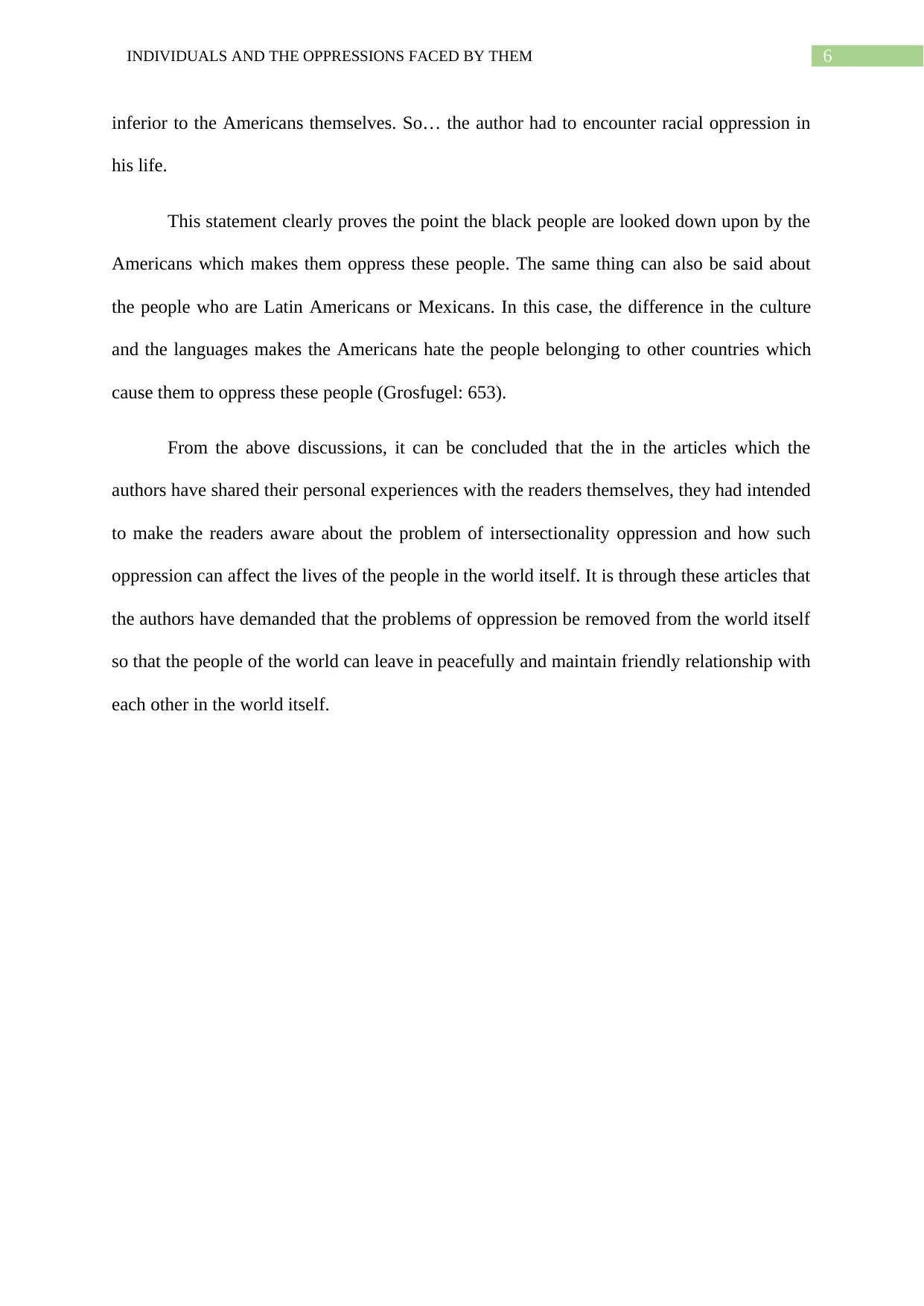
6INDIVIDUALS AND THE OPPRESSIONS FACED BY THEM
inferior to the Americans themselves. So… the author had to encounter racial oppression in
his life.
This statement clearly proves the point the black people are looked down upon by the
Americans which makes them oppress these people. The same thing can also be said about
the people who are Latin Americans or Mexicans. In this case, the difference in the culture
and the languages makes the Americans hate the people belonging to other countries which
cause them to oppress these people (Grosfugel: 653).
From the above discussions, it can be concluded that the in the articles which the
authors have shared their personal experiences with the readers themselves, they had intended
to make the readers aware about the problem of intersectionality oppression and how such
oppression can affect the lives of the people in the world itself. It is through these articles that
the authors have demanded that the problems of oppression be removed from the world itself
so that the people of the world can leave in peacefully and maintain friendly relationship with
each other in the world itself.
inferior to the Americans themselves. So… the author had to encounter racial oppression in
his life.
This statement clearly proves the point the black people are looked down upon by the
Americans which makes them oppress these people. The same thing can also be said about
the people who are Latin Americans or Mexicans. In this case, the difference in the culture
and the languages makes the Americans hate the people belonging to other countries which
cause them to oppress these people (Grosfugel: 653).
From the above discussions, it can be concluded that the in the articles which the
authors have shared their personal experiences with the readers themselves, they had intended
to make the readers aware about the problem of intersectionality oppression and how such
oppression can affect the lives of the people in the world itself. It is through these articles that
the authors have demanded that the problems of oppression be removed from the world itself
so that the people of the world can leave in peacefully and maintain friendly relationship with
each other in the world itself.
Paraphrase This Document
Need a fresh take? Get an instant paraphrase of this document with our AI Paraphraser
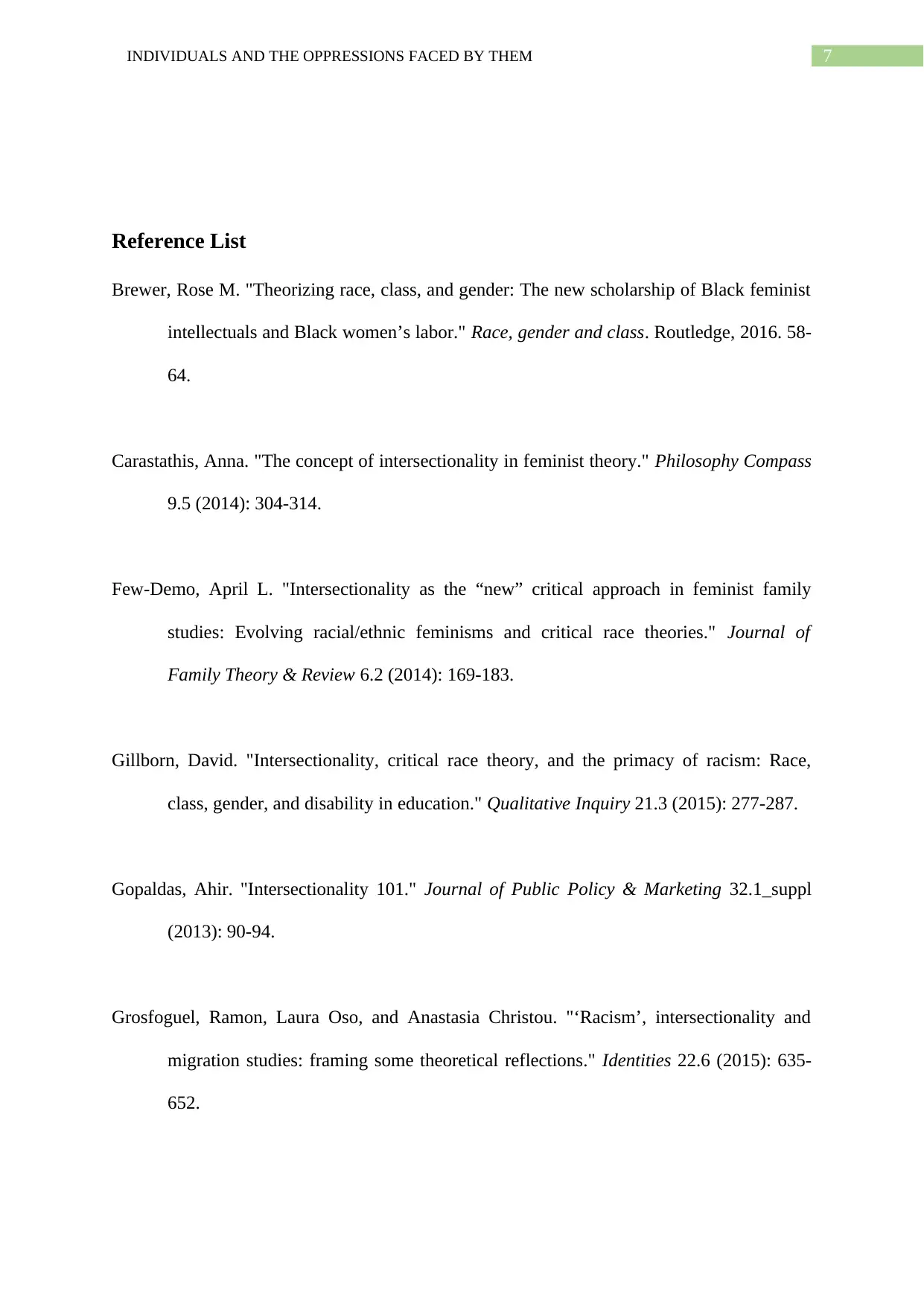
7INDIVIDUALS AND THE OPPRESSIONS FACED BY THEM
Reference List
Brewer, Rose M. "Theorizing race, class, and gender: The new scholarship of Black feminist
intellectuals and Black women’s labor." Race, gender and class. Routledge, 2016. 58-
64.
Carastathis, Anna. "The concept of intersectionality in feminist theory." Philosophy Compass
9.5 (2014): 304-314.
Few‐Demo, April L. "Intersectionality as the “new” critical approach in feminist family
studies: Evolving racial/ethnic feminisms and critical race theories." Journal of
Family Theory & Review 6.2 (2014): 169-183.
Gillborn, David. "Intersectionality, critical race theory, and the primacy of racism: Race,
class, gender, and disability in education." Qualitative Inquiry 21.3 (2015): 277-287.
Gopaldas, Ahir. "Intersectionality 101." Journal of Public Policy & Marketing 32.1_suppl
(2013): 90-94.
Grosfoguel, Ramon, Laura Oso, and Anastasia Christou. "‘Racism’, intersectionality and
migration studies: framing some theoretical reflections." Identities 22.6 (2015): 635-
652.
Reference List
Brewer, Rose M. "Theorizing race, class, and gender: The new scholarship of Black feminist
intellectuals and Black women’s labor." Race, gender and class. Routledge, 2016. 58-
64.
Carastathis, Anna. "The concept of intersectionality in feminist theory." Philosophy Compass
9.5 (2014): 304-314.
Few‐Demo, April L. "Intersectionality as the “new” critical approach in feminist family
studies: Evolving racial/ethnic feminisms and critical race theories." Journal of
Family Theory & Review 6.2 (2014): 169-183.
Gillborn, David. "Intersectionality, critical race theory, and the primacy of racism: Race,
class, gender, and disability in education." Qualitative Inquiry 21.3 (2015): 277-287.
Gopaldas, Ahir. "Intersectionality 101." Journal of Public Policy & Marketing 32.1_suppl
(2013): 90-94.
Grosfoguel, Ramon, Laura Oso, and Anastasia Christou. "‘Racism’, intersectionality and
migration studies: framing some theoretical reflections." Identities 22.6 (2015): 635-
652.
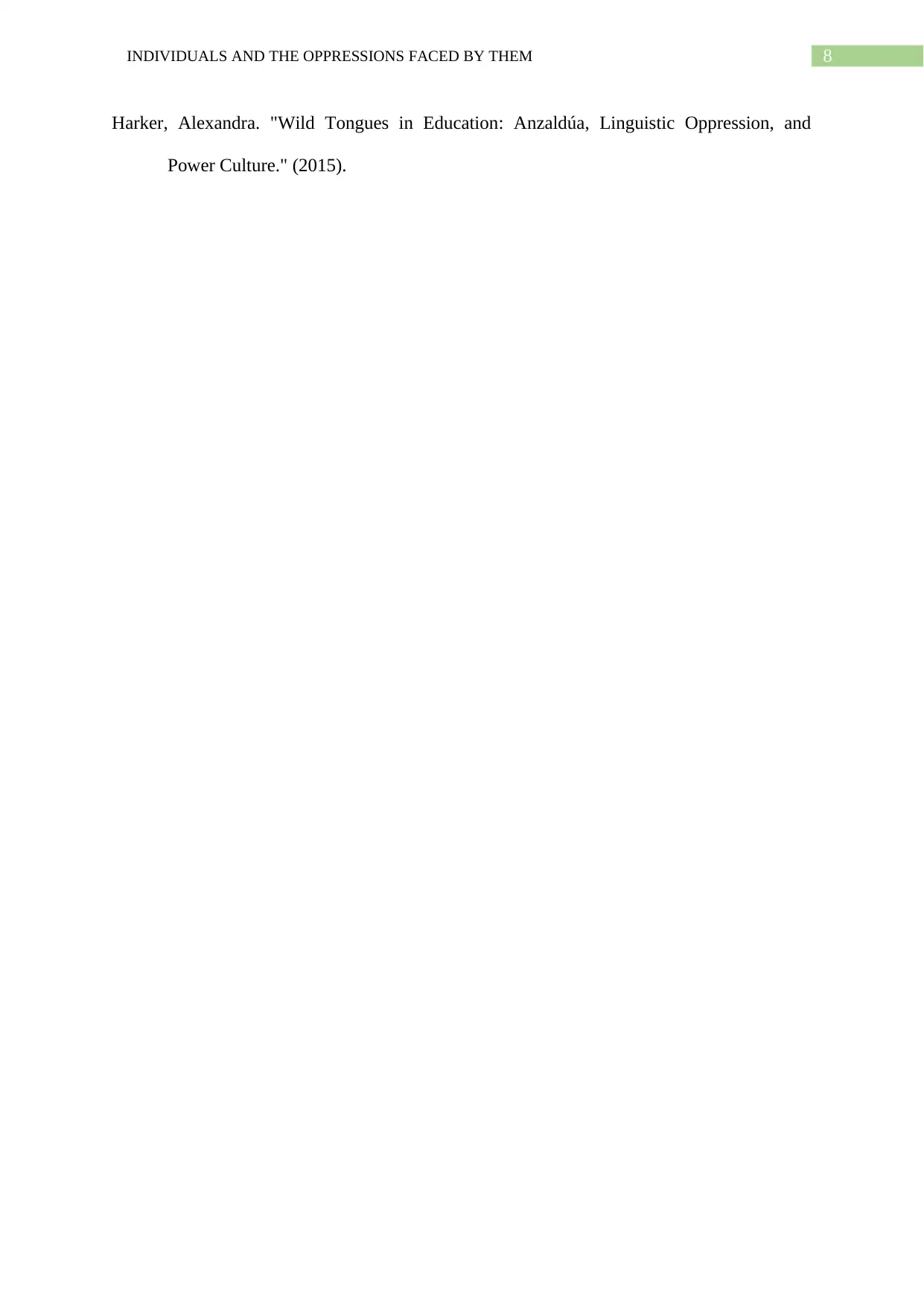
8INDIVIDUALS AND THE OPPRESSIONS FACED BY THEM
Harker, Alexandra. "Wild Tongues in Education: Anzaldúa, Linguistic Oppression, and
Power Culture." (2015).
Harker, Alexandra. "Wild Tongues in Education: Anzaldúa, Linguistic Oppression, and
Power Culture." (2015).
⊘ This is a preview!⊘
Do you want full access?
Subscribe today to unlock all pages.

Trusted by 1+ million students worldwide
1 out of 9
Related Documents
Your All-in-One AI-Powered Toolkit for Academic Success.
+13062052269
info@desklib.com
Available 24*7 on WhatsApp / Email
![[object Object]](/_next/static/media/star-bottom.7253800d.svg)
Unlock your academic potential
Copyright © 2020–2026 A2Z Services. All Rights Reserved. Developed and managed by ZUCOL.





